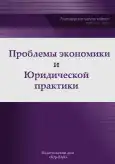Прогнозирование миграционных процессов в Германии
- Авторы: Трегуб И.В.1, Абраимова К.А.1
-
Учреждения:
- Финансовый Университет при Правительстве Российской Федерации
- Выпуск: Том 18, № 1 (2022)
- Страницы: 141-149
- Раздел: Статьи
- URL: https://journal-vniispk.ru/2541-8025/article/view/147400
- ID: 147400
Цитировать
Аннотация
Ключевые слова
Полный текст
Открыть статью на сайте журналаОб авторах
Илона Владимировна Трегуб
Финансовый Университет при Правительстве Российской Федерации
Email: ilonavl_fa@mail.ru
доктор экономических наук, профессор департамента математики Москва, Российская Федерация
Кристина Алексеевна Абраимова
Финансовый Университет при Правительстве Российской Федерации
Email: kabraimova@gmail.com
Москва, Российская Федерация
Список литературы
- Ангита Ольмедо С., Консалес Гомес дель Миньо П. Кризис мигрантов в Средиземноморье: многоплановый вызов для Европейского союза // Вестник Российского университета дружбы народов. Серия: Социология. 2019. Т. 19. №4. с. 625-626.
- Бабурим Вячеслав Л. Устойчивость государств большого Балтийского региона к изменениям рыночного цикла // Балтийский регион. 2019. Т. 11. №1. с. 7-8.
- Гладкий Ю. Н., Гладкий И. Ю., Эйдемиллер К.Ю. Распространение ислама в странах Балтии: плоды европейского мультикультурализма // Балтийский регион. 2017. Т. 9. №3. с. 33-34.
- Дж. Сапир Накапливает ли еврозона историческое отставание от Азии в контексте COVID-19? // Экономическое возрождение России. 2021. №1(67). с. 89.
- Дружинин Павел В., Прокопьев Егор А. Оценка экономических показателей стран Балтийского региона ЕС // Балтийский регион. 2018. Т. 10. №1. с. 4-18.
- Ерохина О. В., Литценбергер О. А. Немецкие колонисты в миграционной политике российского самодержавия // Вестник Российского университета дружбы народов. Серия: История России. 2020. Т. 19. №4. с. 810-823.
- Жозе К. Маркес, Ана Виейра и Рикарду Виейра Миграционные и интеграционные процессы в Португалии: роль межкультурного посредничества // Журнал Сибирского федерального университета. Гуманитарные науки. 2019. №12(2). с. 187-204.
- Карнаухова Е. Е., Весельникова Л. И., Лобанова Н. С. Характер и динамика миграции в современной Германии: исторические и политические контексты // Вестник Нижегородского университета им. Н. И. Лобачевского. 2019. №3. с. 17-18.
- Кириллов Алексей К., Караваева Анастасия Г. Ради веры или ради земли? Религия как фактор конфликтов между мигрантами и старожилами в ходе Великого сибирского переселения // Журнал Сибирского Федерального университета. Гуманитарные науки. 2019. №11(9). с. 1399.
- Круссманн Томас Уголовное право и права человека-некоторые примеры возникновения европейского уголовного права // Всероссийский криминологический журнал. 2020. Т. 14. №5. с. 745-757.
- Маргарита Урда Ответственность за миграционные правонарушения по законодательству зарубежных стран// Вестник Российской правовой академии. 2019. №12(3). с. 470-491
- Межевич Нилолай М., Зверев Юрий М. Восточная Прибалтика: экономические дилеммы безопасности // Балтийский регион. 2018. Т. 10. №1. с. 73-88.
- Мерл Стефан Современность и неспособность поддерживать мир (1918-1938): равнение случаев Советского Союза и Германского рейха // Мир России. Социология. Этнология. 2020. Т. 29. №1. с. 103-131.
- Муйдинов Д. Н. Основные проблемы современных социальных процессов в Европе: миграция как политический инструмент // Вестник Поволжского института управления. 2017. Т. 19. №5. c. 19-22.
- Тильманн Беккер, Сандра Линк Прямые иностранные инвестиции: изменения в Германии // Kings&Wood Mallesons. 2020.
- Трегуб И.В. The capital market model on the example of Norway / В сборнике: Forum for Reseach in Empirical Internation Trade. Сан Рафаэль. 2015.
- Трегуб И.В. Анализ современного состояния и перспективы развития рынка телекоммуникаций // Телекоммуникации. 2008. № 10. С. 40-43.
- Трегуб И.В. Моделирование ценообразования на дополнительные услуги сотовой связи на рынке телекоммуникаций / диссертация на соискание ученой степени доктора экономических наук / Финансовый университет при Правительстве Российской Федерации. Москва. 2010.
- Фильтер Коффе Почему и как мигрировать в Германию // Иммиграционный мир. 2018.
- Юлия С. Ивченко Определение основных факторов уровня валового регионального продукта методами эконометрического моделирования для совокупности регионов Российской Федерации // Статистика и экономика. 2019. Т. 16. №6. с. 4-17.
Дополнительные файлы








